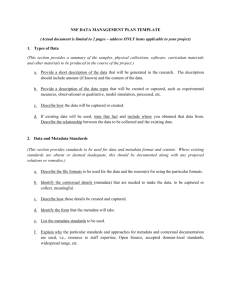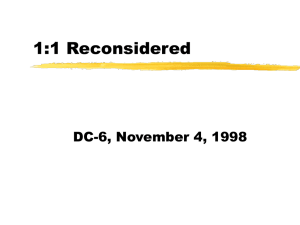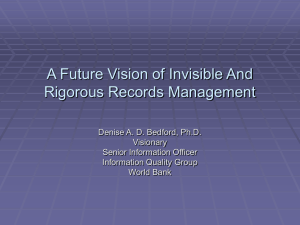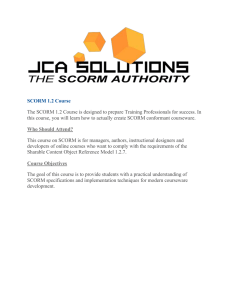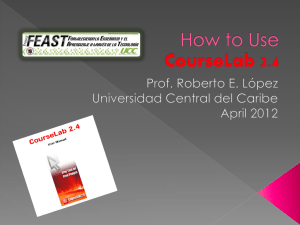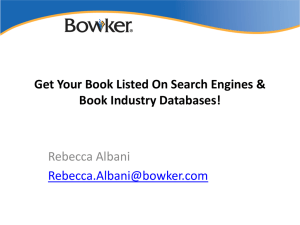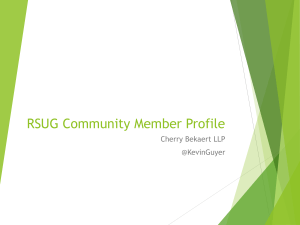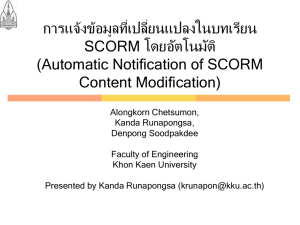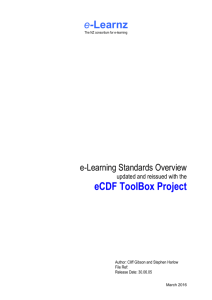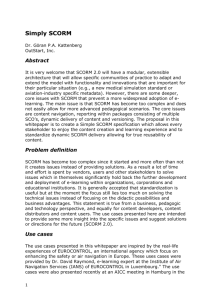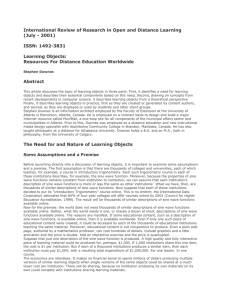1. Introduction
advertisement
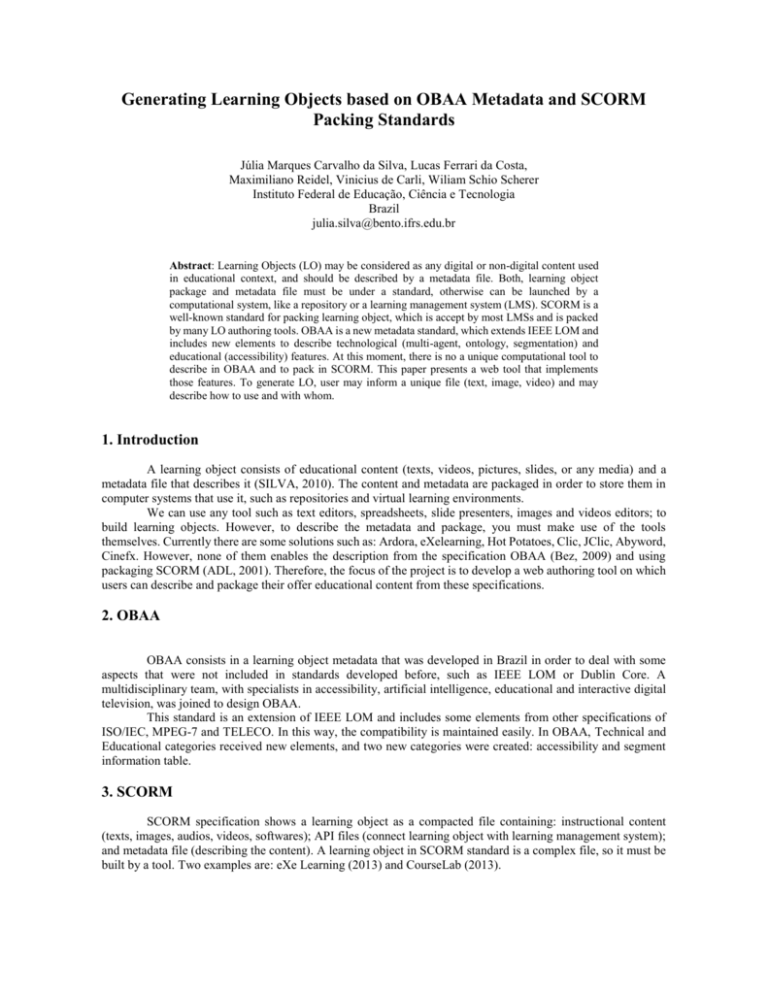
Generating Learning Objects based on OBAA Metadata and SCORM Packing Standards Júlia Marques Carvalho da Silva, Lucas Ferrari da Costa, Maximiliano Reidel, Vinicius de Carli, Wiliam Schio Scherer Instituto Federal de Educação, Ciência e Tecnologia Brazil julia.silva@bento.ifrs.edu.br Abstract: Learning Objects (LO) may be considered as any digital or non-digital content used in educational context, and should be described by a metadata file. Both, learning object package and metadata file must be under a standard, otherwise can be launched by a computational system, like a repository or a learning management system (LMS). SCORM is a well-known standard for packing learning object, which is accept by most LMSs and is packed by many LO authoring tools. OBAA is a new metadata standard, which extends IEEE LOM and includes new elements to describe technological (multi-agent, ontology, segmentation) and educational (accessibility) features. At this moment, there is no a unique computational tool to describe in OBAA and to pack in SCORM. This paper presents a web tool that implements those features. To generate LO, user may inform a unique file (text, image, video) and may describe how to use and with whom. 1. Introduction A learning object consists of educational content (texts, videos, pictures, slides, or any media) and a metadata file that describes it (SILVA, 2010). The content and metadata are packaged in order to store them in computer systems that use it, such as repositories and virtual learning environments. We can use any tool such as text editors, spreadsheets, slide presenters, images and videos editors; to build learning objects. However, to describe the metadata and package, you must make use of the tools themselves. Currently there are some solutions such as: Ardora, eXelearning, Hot Potatoes, Clic, JClic, Abyword, Cinefx. However, none of them enables the description from the specification OBAA (Bez, 2009) and using packaging SCORM (ADL, 2001). Therefore, the focus of the project is to develop a web authoring tool on which users can describe and package their offer educational content from these specifications. 2. OBAA OBAA consists in a learning object metadata that was developed in Brazil in order to deal with some aspects that were not included in standards developed before, such as IEEE LOM or Dublin Core. A multidisciplinary team, with specialists in accessibility, artificial intelligence, educational and interactive digital television, was joined to design OBAA. This standard is an extension of IEEE LOM and includes some elements from other specifications of ISO/IEC, MPEG-7 and TELECO. In this way, the compatibility is maintained easily. In OBAA, Technical and Educational categories received new elements, and two new categories were created: accessibility and segment information table. 3. SCORM SCORM specification shows a learning object as a compacted file containing: instructional content (texts, images, audios, videos, softwares); API files (connect learning object with learning management system); and metadata file (describing the content). A learning object in SCORM standard is a complex file, so it must be built by a tool. Two examples are: eXe Learning (2013) and CourseLab (2013). 4. Web Tool You need to have educational content already built in another tool, being here only describe the metadata and package it. For this, the user enters the file where the content and complete the form with information about the learning object. By submitting, the program generates the metadata file in XML format and following the specification OBAA, the HTML page that invokes the educational content and packaging as SCORM. Figure 1 shows the web tool. Figure 1: Web tool The tool was developed using the PHP programming language. Figure 2 illustrates the general process of operation of the tool. The fields are filled and it generated a file in ZIP format, maintaining compliance with the SCORM specification. The ZIP file contains the following items: The file metadata in XML, called imsmanifest.xml, that contains the information on the form; The media sent by the teacher, with the content being worked on learning object and, An HTML page responsible for showing the media sent by the teacher, and that can be run on any browser or LMS (Learning Management System). Figure 2: Learning Object development using the tool The HTML page that is generated by the authoring tool fits each content that is available: If the learning object is an image, for example, the system generates a page showing the image, already contained in the body of the HTML page. If a file already in DOC format, the generated page will contain a link to the OA in question. If video, a video player will occupy the HTML page and if an audio file, the audio player is automatically implemented on the page. For other formats that the system does not recognize the generated page will only contain a link to download the learning object. 5. Conclusion The authoring tool developed allows the generation of learning objects OBAA and SCORM specification, as the description of metadata. Learning objects have created a great contribution to the students as they receive a good quality material, already “tested” with other students. The teacher also wins by not having to develop their own learning objects to use the existing ones. Still missing tests with the authoring tool in question, but it is believed that it is easy to use, allowing anyone with basic computer knowledge to create digital content. However, it is known that for complete filling of the current form it takes some technical knowledge and pedagogical. Based on this, the research will continue to work to minimize the user to generate their learning objects, initially seeking to automate the filling of fields. References ADL. (2001) The SCORM Run-Time Environment Advanced Distributed Learning. Bez, M. R. et al. (2009) OBAA Project: An approach to interoperable learning objects based on Web and digital television. Informática na Educação: teoria & prática, Porto Alegre, v. 12, n. 1, p. 119-126, jan./jun. CourseLab (2013). CourseLab – free e-Learning authoring tool. http://www.courselab.com Exe Learning. (2013) eXe Learning Tool. http://www.exelearning.org. Silva, J. M. C. (2011) Análise Técnica e Pedagógica de Metadados para Objetos de Aprendizagem. Tese de Doutorado. Universidade Federal do Rio Grande do Sul.
